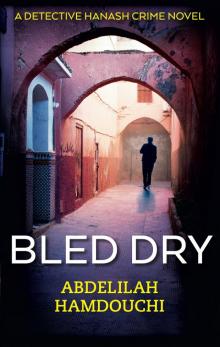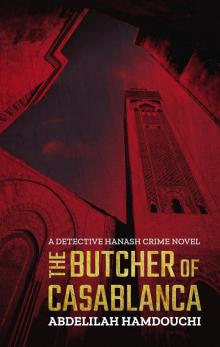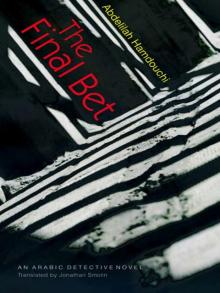- Home
- Abdelilah Hamdouchi
Whitefly
Whitefly Read online
Born in Meknès, Morocco, in 1958, Abdelilah Hamdouchi is one of the first writers of police fiction in Arabic and a prolific, award-winning screenwriter of police thrillers. Many of his novels, including the acclaimed The Final Bet, address democracy and human rights issues. He lives in Rabat, Morocco.
Translator Jonathan Smolin is the author of the critically acclaimed Moroccan Noir: Police, Crime, and Politics in Popular Culture (2013). He lives in Hanover, NH.
Whitefly
Abdelilah Hamdouchi
Translated by
Jonathan Smolin
This electronic edition published in 2016 by
Hoopoe
113 Sharia Kasr el Aini, Cairo, Egypt
420 Fifth Avenue, New York, NY 10018
www.hoopoefiction.com
Hoopoe is an imprint of the American University in Cairo Press
www.aucpress.com
Copyright © 2000 by Abdelilah Hamdouchi
First published in Arabic in 2000 as al-Dhubaba al-bayda’ by al-Muttaqī Brīntira
Protected under the Berne Convention
English translation copyright © 2016 by Jonathan Smolin
All rights reserved. No part of this publication may be reproduced, stored in a retrieval system, or transmitted in any form or by any means, electronic, mechanical, photocopying, recording, or otherwise, without the prior written permission of the publisher.
ISBN 978 977 416 751 5
eISBN 978 1 61797 722 0
Version 1
In the good mystery there is nothing wasted, no sentence, no word that is not significant. And even if it is not significant, it has the potential to be so.
—Paul Auster
1
THE RAIN LET UP AROUND three o’clock. Detective Laafrit of the Criminal Investigations Unit approached his third-floor office window and looked out over the boulevard. Bright beams from the sun disappearing behind the rooftops slipped through the two buildings opposite him. The main police station here in Tangier was strangely quiet—the typewriters were silent, all meetings were postponed, and the offices were empty. If not for the security guard standing by the front door brandishing his gun, it would have been easy for anyone to come in off the street and wander around.
Through the glass, Laafrit became immersed in the back alleys. He could see the port clearly between the two buildings when he moved his head to avoid a large billboard. This glimpse of the port always enticed him to follow the boats setting out from Tangier to the other side. Each time, he’d wonder why they didn’t shoot this captivating view for postcards since the boats looked from here like they were sailing between the buildings. Laafrit could also hear piercing sirens that drowned out the traffic. They were coming from ambulances, fire trucks, and police cars, exactly like the buildup to the climax of an American movie.
The scene now in Tangier was the real thing. It was in all of today’s newspapers. The Bride of the North put two huge headlines on its front page: “Hundreds of Unemployed Youth Await News at Employment Office Gate” and “Hundreds of Unemployed University Graduates Organize Protest March.” According to reports from informants who had flocked to the police station that morning, hidden hands were coordinating the two groups so they would combine into a huge demonstration marching toward City Hall.
Detective Laafrit, until now, had been spared from the police mobilization. The reason was that he had to finish off an urgent report on a case of premeditated poisoning that had claimed three victims. Laafrit had to highlight the criminal evidence so the file wasn’t added to the accidental poisonings that had happened recently in a number of cities, the result of people eating rotten salami. Nonetheless, he was expecting the phone to ring at any minute.
As for Laafrit himself, there was a lot to say. He was a little over forty, had got married seven years ago, and had a beautiful daughter named Reem. He was, to be more precise, of medium height and had a belly that protruded more than it should. His skin was fair, tending to pale, thanks to his incessant late nights. His eyes were melancholic and troubled, with that provocative look you’d expect to find on a cop. It was a look that seemed somewhat ambiguous—affected to a certain extent—but what he was known for most these days was his addiction to sucking on menthol lozenges after he’d quit smoking. His real name was Khalid Ibrahim and he got his nickname “Laafrit,” meaning “crafty,” from his professional and linguistic aptitude: he was the only cop in Tangier who spoke Spanish fluently and with a remarkable nimbleness, something that qualified him to work with the Spanish police as part of bilateral cooperation to fight drugs and illegal immigration.
When Laafrit reached the crowd of unemployed university graduates in front of one of the trade unions’ headquarters, the clash was about to break out. Ten minutes earlier he had received the commissioner’s orders to join in. Despite the speed with which Laafrit had driven his Fiat Uno, the commissioner—who was sixty years old, on the brink of retirement, and suffering from diabetes—greeted him with a scowl that revealed his deep agitation. Laafrit had never seen the commissioner like this before. His hair was disheveled, his tie was crooked, and he was looking around wildly, as if he couldn’t grasp the details of what was about to happen.
Laafrit sensed the confusion. A quick glance over the scene told him that the cafés, businesses, and shops had all shut their doors and hundreds of bystanders were flooding the middle of the street where the demonstration would presumably erupt after a few minutes. The labor-union headquarters was simmering with the crowd of unemployed graduates. Leading them were protestors raising long banners written years ago, still bearing the same slogans, all of them demanding work and criticizing the government. Only a few meters away, all kinds of police squads were lined up, led by helmeted riot-control officers stroking thick clubs. Other police units blocked off the outlets of alleys and streets. They had instructions to break up the crowd and attack as soon as protestors were ten paces from the union headquarters.
Laafrit noticed that the security forces, despite their confident appearance, wouldn’t be able to repel the demonstrators if they decided to confront them. He quickly figured out there were so few men here because the other squads were in front of the employment office. And with the same alertness, he realized the back streets were almost certainly jammed with military vans. He glanced down at his watch, as if he had an appointment.
“I’ll try to talk to them,” Laafrit said, addressing the commissioner.
The commissioner seemed not to hear.
“I said I’ll try to talk to them,” repeated Laafrit. “Even if it’s just a reminder, I’ll make it clear their demonstration’s illegal.”
“No need for a reminder,” responded the commissioner hopelessly. “Dozens of them are law-school graduates.”
Laafrit’s conviction increased.
“We don’t have anything to lose,” he said. “If we can calm them down, we’ll explain that mixing their demonstration with the demonstration of unemployed protestors without university degrees will weaken their position and diminish their value.”
Some interest flashed across the commissioner’s face.
“I’m sure most of them have no idea what’s happening down at the employment office,” added Laafrit.
It suddenly all made sense to the commissioner, and his eyes sparkled. He looked around at the demonstrators and the riot police.
“Go try,” he said, increasingly desperate because of the position he was in. “If you bring them back to their senses, I’ll owe you for the rest of my life. I don’t want to cap off forty years of service with a massacre.”
Laafrit took a deep breath, abandoned his provocative expression, and approached the crowd confidently. One of the demonstrators confronted him, but before he could speak, Laa
frit patted his shoulder in a friendly way.
“Are you one of the protest reps?” asked Laafrit.
“Yes,” replied the demonstrator tensely. “Who are you?”
“Who do you think I am?” said Laafrit, smiling. “One of the cops who tortures protestors?”
The guy had never heard anything like this from the police before. Three more representatives of the unemployed university graduates—including a woman—joined him. Laafrit appeared to be surrounded.
“I came to talk to you voluntarily, as your brother,” said Laafrit deftly, filling his eyes with sympathy. “I’ve also got an unemployed brother in another city. I know what he suffers . . .”
A piercing siren went off in the distance. One of the protestors started chanting a slogan but was cut off by a signal from one of the representatives.
“Are you talking as a cop?” the girl asked Laafrit in a resolute, combative voice.
“I’m talking in the name of the law. Your demonstration is unlicensed. I’m telling you, as your brother, that they’ll pulverize you if you take ten steps from this spot. This show of strength you see in front of you isn’t a scene out of some movie. I’m not trying to scare you. Out of sympathy, I’m trying to give you advice.
“There’s something else you might not know,” Laafrit continued after a pause. “A crowd bigger than this of unemployed workers without degrees is in front of the employment office. They came from everywhere to sign up to go to Spain for nine months of farm work. We know from our sources these jobs don’t exist—just rumors going around. There’s total chaos, smashed windows, and unemployed youth determined to organize a demonstration like yours that’ll end in front of City Hall. Between you and me, we’ve got irrefutable evidence that hidden hands orchestrating everything chose the timing.”
The girl’s face grew red with anger.
“Fifty jobs in this city were given to people with connections while our association wasn’t even consulted!” she blurted out. “Some of us have waited over seven years for a decent job!”
“The agreement between us and the town,” said another, “stipulates our candidates would get those jobs!”
“I didn’t know this,” said Laafrit. “Do you have proof?”
“Names, dates, and positions. Anything you want. They’ve been toying with our misery. We’re ready to put our ribs to your clubs. We don’t have anything left to lose.”
The commissioner and some inspectors joined in.
“Your ribs are all you have,” said the commissioner, commenting on the last sentence. “Without them, you won’t be able to work, even if jobs are plentiful.”
His comment elicited a few smiles. The commissioner sensed he was beginning to get a grip on the situation and was encouraged to keep going.
“Listen, if what you say about shady hirings is true, I’m ready right now to guarantee you a meeting with the prefect. But only if you put an end to this demonstration.”
“Give us a minute, okay?” one of the representatives interrupted.
The commissioner opened his arms wide in agreement.
The deliberations lasted for more than fifteen minutes, and afterward the representatives of the university graduates came back.
“We demand that the prefect meet us right here and now,” their leader said in an official tone.
The commissioner didn’t respond. He turned away and lifted his cell phone while Laafrit put a menthol lozenge in his mouth. A uniformed police officer stopped in front of him.
“Sir, Inspector Allal wants to talk with you. He just got a report from Central that another drowned body’s washed up near the Malabata shore.”
Laafrit was dumfounded. Only yesterday two corpses had washed ashore, one at Ashkar and another near the city beach. And the day before, a body had washed up on the stretch between the Atlantic and the Mediterranean.
The commissioner looked relaxed after he hung up. He straightened his tie and told the representatives of the unemployed university graduates the prefect was waiting for them.
“The prefecture will send a private car for them,” the commissioner boasted to Laafrit, as if he’d accomplished a great feat.
“Fantastic,” said Laafrit. “Problem solved.”
The commissioner patted the detective on the shoulder gratefully.
“If you don’t need me here any more,” said the detective, “I’ve got to go. Another body just washed up, this time at Malabata.”
The commissioner was silent, as if he were considering what he just heard. All his attention was still fixed on what was going on around him.
“What a time for another body to wash ashore,” he said, waving the hand clutching the cell phone. “Damn it! Get out of here.”
Laafrit crossed the street to a Fiat Uno bearing the word “Police.” He found Inspector Allal sitting in the driver’s seat deeply immersed in his thoughts. His lips were moving mechanically, without revealing his ideas or feelings, as if they were working on their own.
At three years away from retirement, Inspector Allal was considered one of the sturdiest characters in the business. But he’d had prostate surgery last year, and afterward he discovered his life was meaningless. He stopped smoking and going to bars, and even gave up watching soccer games on TV. His friends suspected the old Allal really died when he joined a religious group whose followers were government employees, functionaries, and a variety of middle-class types. They called for a modern Sufism that could be practiced in the workplace.
Laafrit sat down in the car next to the inspector but he didn’t say anything. It was enough to steal a glance at the small prayer beads sliding quickly and skillfully between his fingers. While waiting for Allal to finish his repetitions praising God, Laafrit listened closely to the police radio. Reports were coming in about the chaos in front of the employment office and the police intervening with force to disperse the demonstrators.
Finally, the inspector’s lips formed the last sentence of his invocations. He put his prayer beads in his pocket.
“You called?” asked Laafrit jokingly.
“Of course, and with God’s guidance as usual.”
“And?”
“And may God free you from sucking on those lozenges just as he freed you from smoking.”
This was something Laafrit had heard many times.
“Other than that?”
“Other than that, someone found another drowned body, this time on the Malabata shore, only a few meters from Café Rif.”
“Fourth corpse in three days,” said Laafrit. “Notified forensics?”
“They might beat us there.”
“Start the siren to clear the road,” said Laafrit.
The car eased slowly through the crowd of cops and then cut through a narrow street to avoid the congestion. They went up a hill leading directly to the boulevard near the main post office. The road was now passable all the way to Malabata.
“Up till now, we haven’t heard about a patera setting out,” said Laafrit.
“Not as far as I know,” responded the inspector. “But it’s strange the patrols were reinforced after the trial of the coast guards who were taking kickbacks from smugglers.”
“Add to that the dangerous sea,” said Laafrit. “It’s crazy a boat would risk setting out. But the corpses just keep washing up.”
When they reached the beach, they drove out to the farthest dry point opposite the sandy shore. It was a hill of rocky ground with gaps full of thistles. Despite the wetness of the area, strong winds were blowing sand and pebbles all over the place. The waves made a sound like slamming doors. The beach was empty except for the outlines of some people standing far away, under the wooden awning of Café Rif, which was practically abandoned.
The body tossed up on the beach was a male of about thirty. His features were clear and his clothes were distinctive. He had on a leather jacket with big pockets and dark khaki pants, like those soldiers wear. His shoes were authentic new Nikes, as if the guy had bo
ught them just to drown in them. The corpse was laid out on its back and the tracks where it had been pulled from the water were visible on the sand.
Laafrit turned toward Café Rif and saw the bystanders had taken off.
“No doubt they’re the ones who pulled him from the water,” said the inspector.
“I hope they weren’t messing with the body before we got here,” said Laafrit.
Before he finished his sentence, a taxi pulled up and someone from forensics got out. He hurried over with a leather briefcase under his arm. Humpbacked, with a face concealed under thick glasses, this was the shortest cop in Tangier. His name was Abdellah, but when he wasn’t around they called him “the Dwarf.” Panting, he stopped in front of the body without paying it the least bit of attention.
“All our cars are busy with the demonstrations,” he said bitterly. “That bastard wanted to charge me.”
“Did you take down his plate number?” Laafrit asked, laughing.
“Of course. I’ll make his life hell with the traffic cops. He’ll rue the day he became a taxi driver.”
Inspector Allal moved away from the two. He snuck his prayer beads out of his pocket and gazed humbly at the sea.
“This guy and the others were duped,” said Abdellah, looking down at the drowned body. “Human traffickers take them out from the Atlantic coast and toss them into the Mediterranean just opposite Tangier, telling them they’ve made it to Spain.”
“If it’s like you say, other bodies will definitely turn up,” said Laafrit.
“Who pulled him from the water?” asked Inspector Abdellah.
“We don’t know. Maybe the guy who reported it. There were some people in front of Café Rif but they disappeared as soon as they saw us.”
“Don’t worry about them. They’re just hash smokers.”
Abdellah pulled a black camera with a big flash out of his bag and took a wide-angled photo of the body. He took pictures of the face and then shots from the front, side, and back. Laafrit walked over to Inspector Allal.
“God be praised,” Laafrit said to him.

 Bled Dry
Bled Dry The Butcher of Casablanca
The Butcher of Casablanca The Final Bet
The Final Bet Whitefly
Whitefly